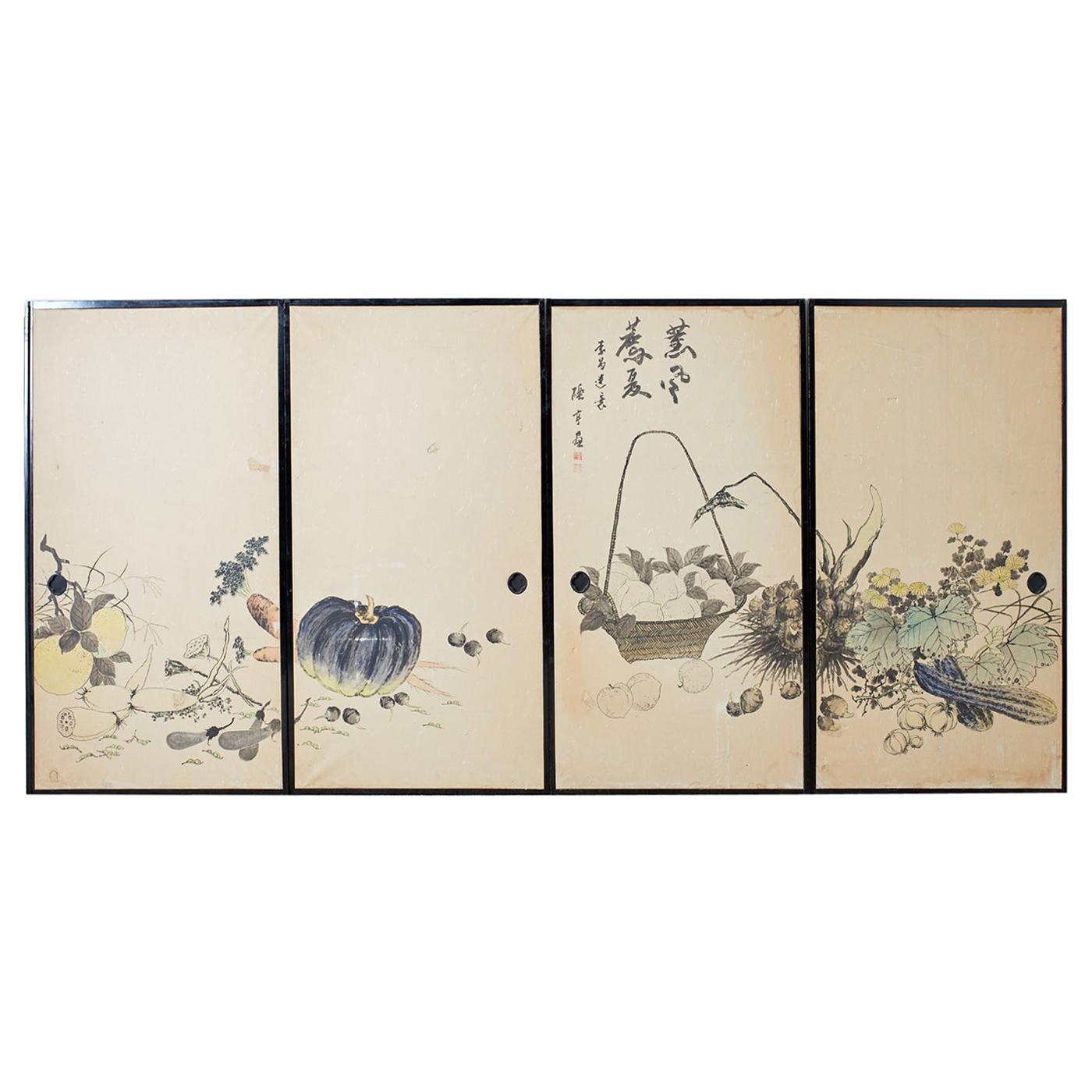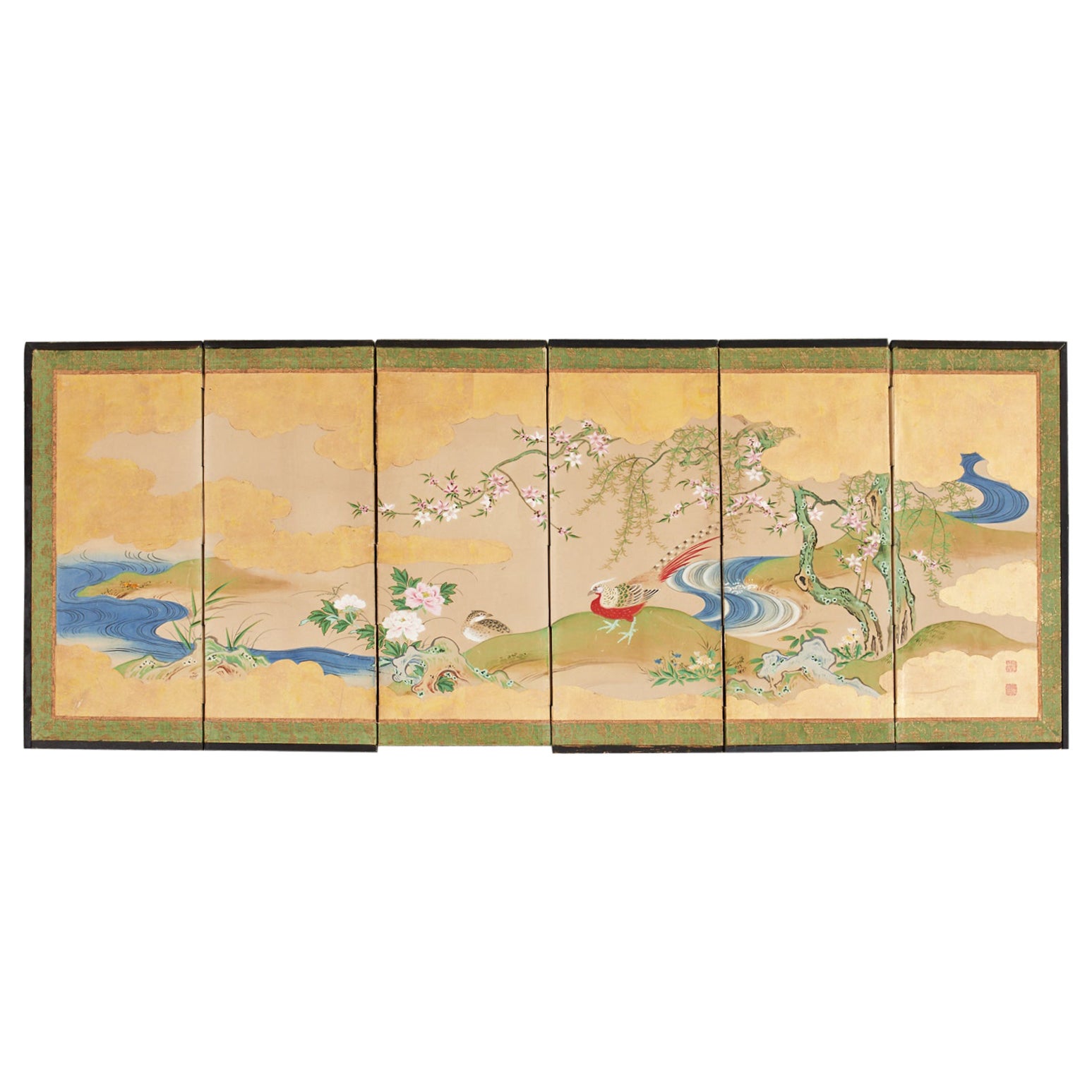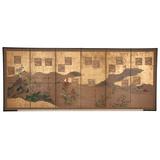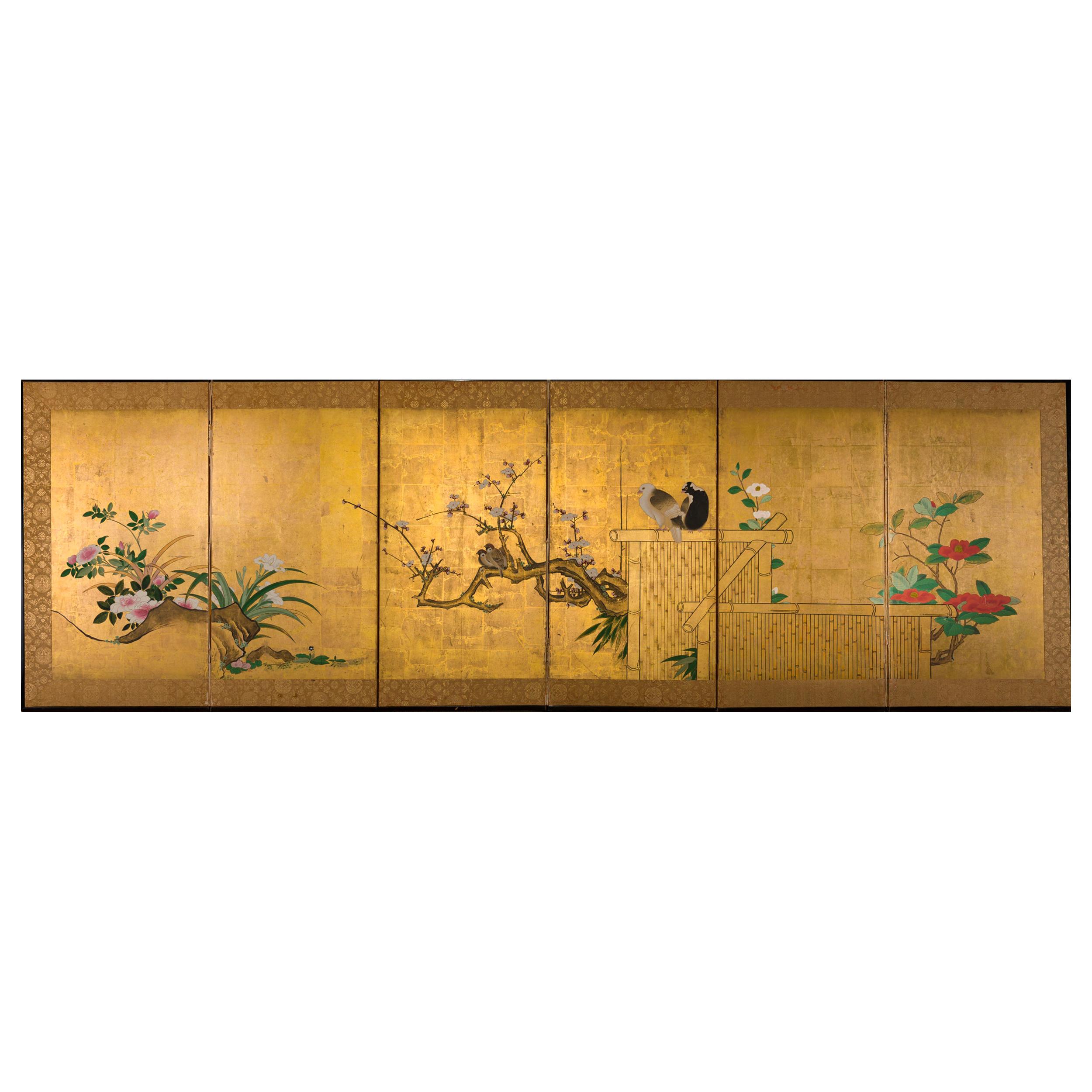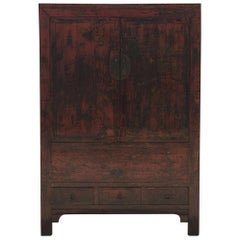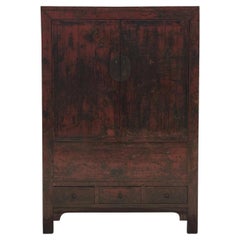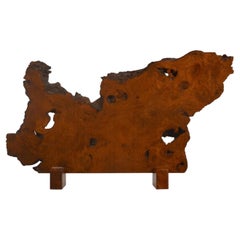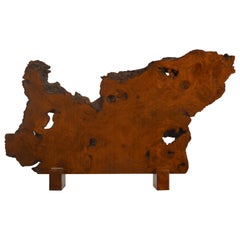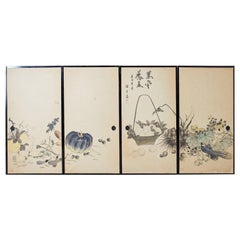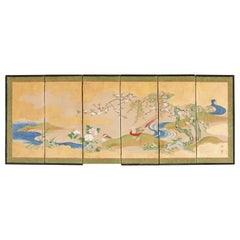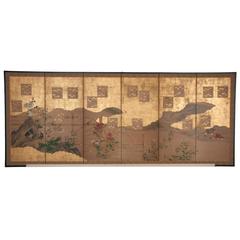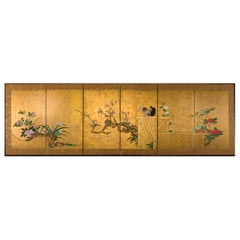Items Similar to Stunning Set of Four 19th Century Edo Period Fusuma Door Decorative Panels
Want more images or videos?
Request additional images or videos from the seller
1 of 15
Stunning Set of Four 19th Century Edo Period Fusuma Door Decorative Panels
$16,000
£12,146.93
€13,893.49
CA$22,354.32
A$24,862.88
CHF 12,982.63
MX$302,554.85
NOK 165,807.94
SEK 155,498.59
DKK 103,692.47
Shipping
Retrieving quote...The 1stDibs Promise:
Authenticity Guarantee,
Money-Back Guarantee,
24-Hour Cancellation
About the Item
A set of four fusuma (sliding door) panels from the 19th century, painted in ink and colors on gold leaf. The panels depict a blossoming cherry tree extending beyond a woven fence and over a pond with ducks, mallards, and cranes. Reeds line the pond’s edge, all set against a gold background.
Each panel includes an oval floriform metal hikite (door pull) and is framed in black-lacquered wood. The work highlights the traditional materials and techniques of Edo period in Japan.
This unique museum-quality piece is a rare example of Japanese craftsmanship from the period still in excellent condition.
Dimensions listed are for each panel.
Sold as a set.
- Dimensions:Height: 68.5 in (173.99 cm)Width: 37 in (93.98 cm)Depth: 1.5 in (3.81 cm)
- Style:Edo (Of the Period)
- Materials and Techniques:
- Place of Origin:
- Period:
- Date of Manufacture:Late 19th Century
- Condition:Wear consistent with age and use. All original. Rare in such good condition.
- Seller Location:Los Angeles, CA
- Reference Number:1stDibs: LU818444797992
About the Seller
5.0
Platinum Seller
Premium sellers with a 4.7+ rating and 24-hour response times
Established in 2005
1stDibs seller since 2006
898 sales on 1stDibs
Typical response time: <1 hour
- ShippingRetrieving quote...Shipping from: Los Angeles, CA
- Return Policy
Authenticity Guarantee
In the unlikely event there’s an issue with an item’s authenticity, contact us within 1 year for a full refund. DetailsMoney-Back Guarantee
If your item is not as described, is damaged in transit, or does not arrive, contact us within 7 days for a full refund. Details24-Hour Cancellation
You have a 24-hour grace period in which to reconsider your purchase, with no questions asked.Vetted Professional Sellers
Our world-class sellers must adhere to strict standards for service and quality, maintaining the integrity of our listings.Price-Match Guarantee
If you find that a seller listed the same item for a lower price elsewhere, we’ll match it.Trusted Global Delivery
Our best-in-class carrier network provides specialized shipping options worldwide, including custom delivery.More From This Seller
View All19th Century Antique Chinese Chinoiserie Hand-Painted Lacquer Cabinet
Located in Los Angeles, CA
Unique Chinese lacquer cabinet from the original Spago restaurant on Sunset Boulevard in Los Angeles, currently being remodeled. Patinated bronze hardware.
Category
Antique 19th Century Chinese Chinese Export Cabinets
Materials
Bronze
19th Century Antique Chinese Chinoiserie Hand-Painted Lacquer Cabinet
Located in Los Angeles, CA
Unique Chinese lacquer cabinet from the original Spago restaurant on Sunset Boulevard in Los Angeles, currently being remodeled. Patinated bronze hardware.
Category
Antique 19th Century Chinese Chinese Export Cabinets
Materials
Bronze
Sculptural Japanese Keyaki Wood Partition in the Style of Nakashima
By George Nakashima
Located in Los Angeles, CA
Sculptural Japanese keyaki wood partition in the style of Nakashima.
Category
Vintage 1960s Japanese Organic Modern Mounted Objects
Materials
Hardwood
Sculptural Japanese Keyaki Wood Partition in the Style of Nakashima
By George Nakashima
Located in Los Angeles, CA
Sculptural Japanese keyaki wood partition in the style of Nakashima.
Category
Vintage 1960s Japanese Organic Modern Mounted Objects
Materials
Hardwood
Sculptural Japanese Keyaki Wood Partition in the Style of Nakashima
By George Nakashima
Located in Los Angeles, CA
Sculptural Japanese keyaki wood partition in the style of Nakashima.
Category
Vintage 1960s Japanese Organic Modern Mounted Objects
Materials
Hardwood
Rare Set of Two Framed Oil Paintings by Ivan da Silva Bruhns
By Ivan da Silva Bruhns
Located in Los Angeles, CA
Rare set of two small framed oil paintings by Ivan da Silva Bruhns, (Paris, 1881-Antibes, 1980). Unique works. Signed. Each panel is 9 in. Wi...
Category
Vintage 1910s French Art Deco Paintings
Materials
Glass, Wood
You May Also Like
Set of Four Japanese Fusuma Painted Door Panels
Located in Rio Vista, CA
Rare set of four Japanese Showa period door panels known as Fusuma in Japanese architecture. Similar to a Shoji room divider but made of an opaque materia...
Category
20th Century Japanese Showa Paintings and Screens
Materials
Brass
$2,400 Sale Price / set
20% Off
Japanese Edo Six Panel Table Screen After Maruyama Okyo
Located in Rio Vista, CA
Fantastic diminutive Japanese Edo period table top screen depicting a lively water landscape with flora and fauna. The screen is beautifully painted o...
Category
Antique 19th Century Japanese Edo Paintings and Screens
Materials
Brass, Gold Leaf
Japanese Six-Panel Screen
Located in Stamford, CT
A six-panel Japanese paper screen with poems, autumn flowers, bamboo fence and Mandarin ducks. Poems are believed to be earlier but were probably...
Category
Antique Mid-19th Century Japanese Edo Paintings and Screens
Materials
Paper
$19,900
Japanese Six-Panel Screen Late Winter into Early Spring
Located in Hudson, NY
Japanese six-panel screen: Late winter into early spring, Rimpa style painting of a garden scene with doves on a bamboo fence. Flowers in bloom including ...
Category
Antique Early 19th Century Japanese Edo Paintings and Screens
Materials
Gold Leaf
Japanese Edo Six Panel Screen Yoshitsune and Benkei
Located in Rio Vista, CA
Spectacular 19th century Japanese late Edo period six-panel byobu screen depicting Yoshitsune and Benkei, two heroes of Japanese folklore. Crafted in ink and natural color pigments on mulberry paper with thick gold leaf borders on each panel. The character Yoshitsune is seated under a blossoming cherry tree in full armor holding a fan. The warrior priest or monk Benkei is depicted kneeling on a leopard skin...
Category
Antique 19th Century Japanese Edo Paintings and Screens
Materials
Brass, Gold Leaf
$3,400 Sale Price
29% Off
Japanese Four Panel Screen: Early Spring Into Summer
Located in Hudson, NY
Japanese Four Panel Screen: Early Spring Into Summer, Meiji period (1868 -1912) painting of plum in bloom with red camellias on the right and peony and thistle on the left. A clutc...
Category
Antique Early 1900s Japanese Meiji Paintings and Screens
Materials
Gold Leaf
More Ways To Browse
Antique Door Pulls
Antique Over Door Panel
Antique Four Panel Doors
Antique Brass Door Pulls
Antique Fence
Used Metal Doors And Frames
19th Century Oval Painting
Oval Wood Panel
Used Screen Doors
Mallard Furniture
Antique Metal Screen
Japanese Door Panels
Edo Screen Gold
Asian Door Pulls
Japanese Painted Door
Wood Ducks
Antique Japanese Black Lacquer Panels
Metal Fence
